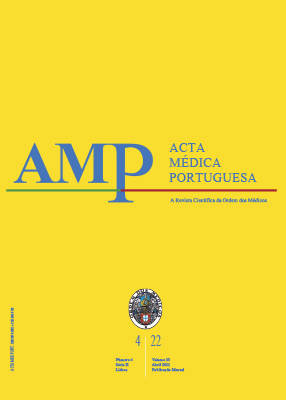Case Report of a Neonate Born to a Mother with Severe SARS-CoV-2 Infection under ECMO
DOI:
https://doi.org/10.20344/amp.16673Keywords:
COVID-19, Extracorporeal Membrane Oxygenation, Infant, Newborn, Osteomyelitis, SARS-CoV-2Abstract
Neonatal SARS-CoV-2 infections are rare and although there is some evidence of vertical transmission, most newborns show no clinical signs or present with only mild clinical symptoms. Fetal survival is reported around 70% in mothers submitted to extracorporeal membrane oxygenation. We present a case of a male newborn born at 29 weeks from a mother under extracorporeal membrane oxygenation due to SARS-CoV-2 infection. There was no evidence of vertical transmission, polymerase chain reaction testing of nasopharyngeal/throat swab and polymerase chain reaction testing of blood sample for SARS-CoV-2 were both negative. On day 2, he developed signs of osteomyelitis of the distal femur extremity, which resolved after six weeks of antibiotic therapy, with no other significant events during admission. This case report depicts the favorable outcome of a live infant born to a mother with severe SARS-CoV-2infection under extracorporeal membrane oxygenation.
Downloads
Downloads
Published
How to Cite
Issue
Section
License
Copyright (c) 2022 Acta Médica Portuguesa

This work is licensed under a Creative Commons Attribution-NonCommercial 4.0 International License.
All the articles published in the AMP are open access and comply with the requirements of funding agencies or academic institutions. The AMP is governed by the terms of the Creative Commons ‘Attribution – Non-Commercial Use - (CC-BY-NC)’ license, regarding the use by third parties.
It is the author’s responsibility to obtain approval for the reproduction of figures, tables, etc. from other publications.
Upon acceptance of an article for publication, the authors will be asked to complete the ICMJE “Copyright Liability and Copyright Sharing Statement “(http://www.actamedicaportuguesa.com/info/AMP-NormasPublicacao.pdf) and the “Declaration of Potential Conflicts of Interest” (http:// www.icmje.org/conflicts-of-interest). An e-mail will be sent to the corresponding author to acknowledge receipt of the manuscript.
After publication, the authors are authorised to make their articles available in repositories of their institutions of origin, as long as they always mention where they were published and according to the Creative Commons license.









